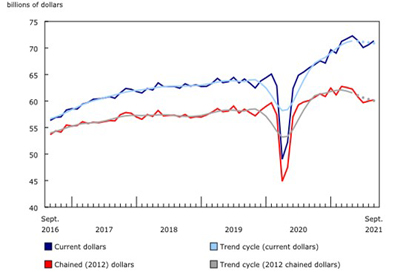The Age of Servic-ization

October 15, 2019
By Rick McCarten
For a long time now, many experts have been pointing out how companies should be expanding their service offerings beyond their product sales. Companies are wrapping services around their product and packaging — everything from special deliveries, warranties, repair and technical assistance to 24-hour service. This “servic-ization” helps differentiate companies from their competitors. How big is this going to get? Some reports have this trend becoming the core of our future economy.
Take Rolls-Royce, a manufacturer of jet engines. These engines are highly sophisticated machines, arguably top of the line in technical intricacy and reliability. Yet Rolls-Royce treats the product like a loss leader because they want the lucrative service contract. Once the engines are sold, they set up monitoring systems for all the engines in the air. They know when an engine needs maintenance, can see if something is not performing to set up for repairs, and replace for end of life. The airlines fly the planes and worry about scheduling and selling seats, while Rolls-Royce looks after the engines. The service contract makes Rolls-Royce more money than the sale of the engine itself.
Peloton is another example; they make stationary bikes for spinning. When you buy their bike you also purchase their monthly service, which allows you to take part in virtual spin classes without leaving your home. It is reported that they make better margins from the in-house spin class services than the actual product sale.
John Deere is currently in a court battle with some of their customers who refuse to use the dealership for maintenance. John Deere claims that while the product is under warranty John Deere still owns the tractor; customers are only leasing it from them. As owners they are demanding it be maintained properly.
Back in pre-industrial times, the landowner/farmer held the wealth. Then came the industrial revolution and factories, and the wealth was transferred from the farm to the factory. Today, there are many wealthy landowners, but anyone who is a fan of Neil Young or Willie Nelson has heard of “farm-aid” and the plight of the small farmer. Meanwhile Kellogg’s, General Mills, Nestle’s, McCain’s and the other big food brands have cornered the food market for the best margins.
Fast forward, now “service” will do to production what production did to agriculture. Peloton and Rolls-Royce have figured out how to transform their business models from product to service. They have transformed from “landowners to food producers.” Not all companies, much like the farmers, will be positioned to do so.
The fact is with digitalization, which is driving much of this, many products will not transform to services but will simply disappear. Think videos, DVDs, GPS, cameras, pagers, even light bulbs. Others will lose their brand strength, which will lower margins.
In service-ization, product branding could be replaced with service branding. The customer will determine the quality of the service provider. The quality of the product will be determined by the service provider. The electrical industry can benefit from service-ization; think about how your company can expand your service offerings beyond traditional product sales.
Rick McCarten is VP, Operations, Electro-Federation Canada.











